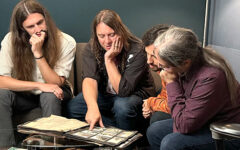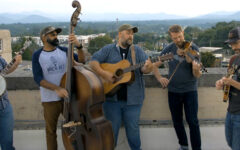 I’ve found several occasions this past few years to offer high praise for Boston-based string band Crooked Still. Originally drawn to them by my interest in their high-profile instrumentalists, Greg Lizst on banjo and (then) cellist, Rushad Eggleston, I quickly discovered that vocalist Aoife O’Donovan and bassist Corey DiMario were every bit their equals and further that, as a unit, they had created a truly new sound, something often promised by overheated publicity, but much more rarely experienced.
I’ve found several occasions this past few years to offer high praise for Boston-based string band Crooked Still. Originally drawn to them by my interest in their high-profile instrumentalists, Greg Lizst on banjo and (then) cellist, Rushad Eggleston, I quickly discovered that vocalist Aoife O’Donovan and bassist Corey DiMario were every bit their equals and further that, as a unit, they had created a truly new sound, something often promised by overheated publicity, but much more rarely experienced.
Their 2006 release, Shaken By A Low Sound was an immediate critical sensation, with writers in a wide variety of acoustic, folk, bluegrass and alternative publications praising the CD, which a good many mainstream periodicals did as well. The title was a reference to the instrumentation, using the cello and string bass as the foundation of the rhythm section, without a guitar, mandolin or fiddle – though those did pop up from guest artists on a few tracks.
The critical success was mirrored in sales, and soon the band was a major attraction at festivals and venues appealing to music lovers of eclectic tastes throughout North America and Europe.
With last week’s release of their latest CD, Still Crooked, and some extensive summer touring, the band is again turning heads.
To my ear, this album succeeds ever bit as well as the last. The arrangements are both sparse and sonically rich, and the songs they’ve chosen are drawn from a variety of sources – new, old and very old. The new project also introduces two new members, as fiddler Brittany Haas and cellist Tristan Clarridge have stepped into the space left by original member Rushad Eggleston’s exit.
I was able to chat yesterday with O’Donovan from California as she was headed for the airport, and a flight to Canada. She discussed several of the songs on Still Crooked, the band’s new personnel, and how she came to a career in music.
“When Rushad left, we decided that the band should expand in whatever way seemed natural. We had considered a cello or a fiddle, but weren’t determined to go in either direction. Last September we got together with both Brittany and Tristan in my living room – our first time playing with potential new members – and it just seemed to work perfectly.
We had always talked about adding a fiddle – even when Rushad was in the band – and had featured fiddle on a few cuts on previous records.”
Aoife contrasted the way songs were chosen for the new CD as opposed to the Shaken project, which was most listeners’ introduction to the band.
“Many of the songs on Shaken By A Low Sound were more familiar to bluegrass and folk music fans [Little Sadie, Can’t You Hear Me Calling, Cumberland Gap]. I think that part of what attracted them to the band was that they recognized the songs, and could more readily accept the different instrumentation.
When we were getting ready to start recording again this time, our producer Eric Merrill, who is something of a folklorist as well, put together a CD for us taken from a bunch of different field recordings. We listened to them all together and looked for songs that would work well for Crooked Still. The first four songs on the album came from Eric’s compilation – these are rare gems that haven’t been over-recorded.
The opening track, Undone In Sorrow, is an Ola Belle Reed song, and we met her son, Ralph Reed, at the ROMP festival in Kentucky recently. We gave him a CD and he emailed us to say that he had listened to it 20 times, that he really loved our arrangement of his mom’s song, and that he was sure that she would have approved.
We were really proud of that”
Another song that struck me is Captain, Captain, which is taken from the singing of Rebecca King Jones, a North Carolina folksinger from the mid-20th century. The lyric tells the timeless story of a wife awaiting news of her husband away at war.
“Her version was haunting, sung a capella. We didn’t want to alter what she had sung, so the arrangement is sparse – not chordally complex – but we do change meter towards the end for the banjo and cello solos.
Amy Helms sang with me on Captain, Captain. She is Levon Helms’ daughter, from The Band, and is a great friend from Woodstock NY. She has a band called Ola Belle, and I love what she sang on that track. She’s just a great singer.”
Not all of the songs are from an earlier age. Did You Sleep Well came from the pen of Nathan Taylor, and Low Down and Dirty is a contribution from Aoife, in which the protagonist dispatches her man in the graveyard.
“Nathan Taylor is a friend I met at Clifftop. He was playing his guitar and sang me that song, and when he was done I looked up and saw a pile of girls sitting on the ground digging the tune. I jumped up right away I told him that I was claiming that one for Crooked Still!
I wrote Low Down and Dirty on Halloween and the title came from an old Hobart Smith song called Graveyard Blues. That’s where I found the line ‘low down and dirty.’ I tried to write something scary and spooky and though the song doesn’t sound like Hobart’s, there is some similarity in the story.
But in his song, Hobart finds her dead and celebrates.”
As you might guess from her name, Aoife is of Irish descent, and still maintains an Irish passport. Her dad was born and raised in Ireland, and Aoife grew up in Boston in a musical home. Her mom was a classically-trained pianist and singer, and her dad was a singer of Irish folk songs.
She tells of a pub show in Ireland from this recent 2008 tour…
“We perform all the songs from Still Crooked in our stage show except for Poor Ellen Smith, since we all switch instruments for that one.
We played in this tiny bar in Galway – a very crowded, hot bar – but we did Poor Ellen Smith as our encore and just played it acoustically – no PA. That set was among the most memorable I can remember.
It’s always a treat for me to play in Ireland since my grandfather, uncles and cousins can come down to the show and hear us play.
Since my dad sang and followed Irish music, I grew up heavily influenced by Irish singers. It’s not at the front of what I sing, but you can hear it in the background.”
Aofie relishes the diverse types of fans they draw, and the fact that the band is asked to perform in many different settings.
“We play folk festivals and some Irish and bluegrass festivals, and I think we could be accepted at a jazz fest as well. We’ll be at a pop and blues festival this weekend in Ottawa.
When we played this year at Grass Valley and ROMP [major traditional bluegrass events], we were the ‘edgy’ band at the festival, but it’s always fun trying to win over different audiences.”
Still Crooked is surely one my top two or three favorite releases from 2008 to date. The CD has a plainly gorgeous sound and I find the material to be especially engaging. O’Donovan’s singing is lovely throughout, but always understated rather than over the top.
Long time fans may miss the mad, frenetic assault of Eggleston’s cello – and I had anticipated being among them – but the lines played by Haas and Clarridge serve as the perfect counterpoint to the simple melodies and Aoife’s voice. They are terrific soloists as well.
Lizst’s banjo playing is truly inspiring. He manages to use the three finger style in service of a different sort of ensemble, and impresses without exception. If you are one of those people who doubt that a banjo can produce a beautiful sound, give this new CD a listen and let’s see what you say.
There is one way in particular where Crooked Still succeeds profoundly – and in a way that so many supposedly alternative bands do not. They understand that a great song can be simply and passionately performed, without the need to prove your avant garde bona fides with elaborate reworkings and unnecessary ornamentation. If you love good songs, good singing and solid picking, this one is for you.
I’m a fan, and you should be too. Get this record.







